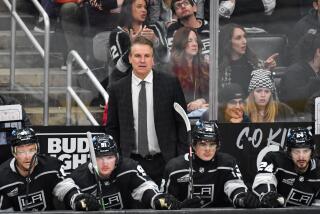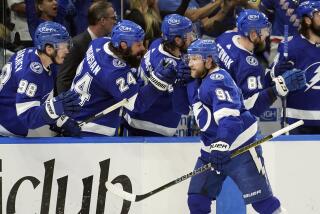High-Flying Flyer : MVP Eric Lindros Is Finally Living Up to Advance Billing, but Stanley Cup Is Still His Ultimate Goal
- Share via
Nothing he had ever done affected Eric Lindros as deeply as winning the NHL’s most-valuable-player award last June.
The plaques he collected in junior hockey, the silver medal he took home from Albertville as a member of the 1992 Canadian Olympic team, the all-rookie-team certificate--they were dust-catchers. Nice, but inconsequential.
Approaching the microphone at the awards gala, looking as natural in black tie as in Flyer black and orange, Lindros realized he had gotten more than just the Hart Trophy--he had been validated as a hockey player. As he began his acceptance speech, Lindros, the immovable, 6-foot-4, 229-pound center on Philadelphia’s potent “Legion of Doom” line, was moved to tears.
Onlookers were stunned. Not so his teammates. They knew how he had struggled to live up to his advance billing and justify the price--six players, two draft picks and $15 million--the Flyers had paid to acquire him from the Quebec Nordiques, who drafted him first overall in 1991 but couldn’t lure Lindros to that French-speaking city.
They also knew the demands he made of himself and how passionately he had wanted to carry the Flyers into the playoffs after five consecutive misses. The Hart Trophy meant he had accomplished all of that. And, at 22, there was so much yet for him to give, and to gain.
“I don’t think there’s ever been a player who came out of juniors with the expectations he did, and it was very, very unfair,” Flyer goaltender Ron Hextall said. “Everybody expected him to be the franchise his first year. As time has gone on, [General Manager] Bob Clarke has brought more pieces in. The team is better and Eric has matured. . . . MVP was one of the first real big goals he had set for himself. He wants to be the best player and he is going to be for a long time. Winning it, that was icing on the cake.
“He’s a person like everybody else. He’s got his ups and downs like everybody else. He’s human. For an athlete to start crying, some people see that as weakness. In retrospect, he wishes it didn’t happen, but I don’t think it’s weakness. It showed he has a human side, like the rest of us.”
Reminders of that emotional moment embarrass him.
“I had a bad cold,” he said, with a smile that acknowledged he knew no one bought that excuse.
“I wouldn’t say I had reached a goal. The goal I had is to reach the Stanley Cup,” he said. “That takes a lot of hard work and a lot of time. Individual goals are nice, but they’re not the ultimate goal in my eyes.
“Expectations are always there, but we have great fan support. We have fans who stood behind us, and instead of taking six or seven years to run it around, we got her going in [his] third year.”
When the Flyers missed the playoffs in his first two seasons, Lindros despaired for their future. But last season, thanks to the work ethic instilled by Coach Terry Murray and the shrewd trades by Clarke, they became a force in the Eastern Conference.
After acquiring left wing John LeClair from Montreal in February, Lindros and the team went on a rampage. Lindros, LeClair and Mikael Renberg combined for 75 goals and 160 points in leading Philadelphia to the Atlantic Division title and the third-best record in the Eastern Conference. Lindros, who missed the season finale because of an eye injury, tied Pittsburgh’s Jaromir Jagr for the scoring lead but lost the title because Jagr had 32 goals to his 29.
In his first playoff series, Lindros so completely mesmerized the Buffalo Sabres that their coach, John Muckler, had to order his players to stop standing around watching him. The Flyers beat Buffalo in five games and swept the defending Stanley Cup champion New York Rangers out of the second round, but they lost to the eventual-champion New Jersey Devils in the conference finals.
Lindros, who tied Rod Brind’Amour for the team playoff lead with 15 points in 15 games, considered winning two rounds “a bit” of a breakthrough.
“Obviously, you’re disappointed if you don’t go to the finals and something’s wrong if you’re not,” he said. “There’s a lot of learning, a sense of keeping an even keel throughout the playoffs, not getting too high or too low. . . . Keeping that composure level is something I took from that.”
Lindros’ superb season and their impressive playoff performance would have been enough to rank the Flyers among this season’s Cup contenders, but Clarke made a pair of free-agent signings that put them among the NHL’s elite.
Adding size to an already big lineup, Clarke signed center Joel Otto to fill a defensive role and added 6-foot-6 defenseman Kjell Samuelsson to muscle opponents away from the Flyers’ net. Philadelphia has been dominant in streaking to a 7-1-2 start, best in the league. And Lindros has nine goals and 11 assists for 20 points in 10 games, tying him with Mario Lemieux of Pittsburgh for the league scoring lead.
“Success breeds confidence, but it also can--and I hope it doesn’t--breed complacency,” he said. “That’s the thing we’ve got to worry about. We’ve got a real good hockey club. When we work hard, we’re a good team. But when we float and don’t work hard, we’re not.”
His teammates believe there’s little danger he will become complacent.
“When you play against him, you figure out his strengths,” Otto said. “But when you see him every day, you see the consistency he plays with and the intensity. From Day 1, when I came to camp, I’ve seen that. He leads by example and works hard. He’s not the type that takes his skills for granted.”
Said center Craig MacTavish: “Having won the MVP might alleviate the pressure of his own career goals and enable him to concentrate, as he pretty much always has, on winning the Stanley Cup and putting individual stuff behind him. Now, more so than ever, he’s really focusing on the Stanley Cup.”
Much more is expected from him and the Flyers this season than ever before, but Lindros is prepared for that.
“You block off everything that everybody else talks about,” he said. “You’ve got things you want to accomplish, how you want to help the team, not only on the ice but off, too, and you set goals. . . .
“I’m pretty relaxed. I bought a house and I got to come back to the same environment. Kjell Samuelsson bought a house across the street--we call it the Swedish embassy. Petr Svoboda is a block away and Craig MacTavish is two minutes away and they’re always real good to the single guys who aren’t real talented in the kitchen.”
His true talents are showcased on the ice.
“He knows what needs to be done, when he needs to make a big hit, when he needs to turn it up,” Hextall said. “He’s our captain, our leader.”
More to Read
Go beyond the scoreboard
Get the latest on L.A.'s teams in the daily Sports Report newsletter.
You may occasionally receive promotional content from the Los Angeles Times.







